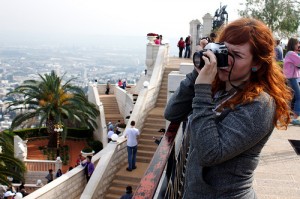
by Maya Bernstein
Commemorating
 It was one week into my family’s trip to Israel, and we lost our camera. Perhaps it was stolen. Most likely it fell out of the bottom of the stroller, while I was digging for sunscreen, or pretzels, or a hat. Perhaps it was the inevitable sacrifice, to appease the gods who watch over those who travel with young children and worry about losing BPA-free bottles and spoons, favorite dolls’ clothing, socks, diaper-bags, not to mention, of course, the children themselves. I noticed the camera was gone when the children were bathed and clean and dressed for the Sabbath. The girls had flower head-bands in their hair and the baby was wearing a vest, the sun was setting over the walls of the old city in Jerusalem, and the air smelled of the exhaust fumes of the last Friday buses, and of jasmine.
It was one week into my family’s trip to Israel, and we lost our camera. Perhaps it was stolen. Most likely it fell out of the bottom of the stroller, while I was digging for sunscreen, or pretzels, or a hat. Perhaps it was the inevitable sacrifice, to appease the gods who watch over those who travel with young children and worry about losing BPA-free bottles and spoons, favorite dolls’ clothing, socks, diaper-bags, not to mention, of course, the children themselves. I noticed the camera was gone when the children were bathed and clean and dressed for the Sabbath. The girls had flower head-bands in their hair and the baby was wearing a vest, the sun was setting over the walls of the old city in Jerusalem, and the air smelled of the exhaust fumes of the last Friday buses, and of jasmine.
What upset me most was losing a week’s worth of pictures. My oldest moaned: “now it’s like we were never here.” I momentarily entertained the thought of buying a new camera, and retracing our steps. My husband suggested that we could leave pages of our photo-album blank; a trip of blind images, wisps of memories trickling ephemeral from between our fingers.
Now, though, that it is Passover, and the leavened excesses of our existence have been burned, for the moment, and, as a people, we are immersed in the preservation of an ancient psychic memory, the loss seems strangely appropriate. It has reminded me to spend some time experiencing, rather than preserving an experience. I have become so accustomed to reflecting while living, that, perhaps, I have cheated myself out of the full joy of being, of living, without trying to figure out how to package, market, preserve that life. My camera, Twitter account, Facebook site, all at once seem like chametz, bloated with self, replete with very me. How appropriate to be without a camera on Passover, to travel, suddenly, lighter, with a different lens. Emptying myself of these vehicles for expression, I find more space to be. I am reminded of a poem by Sir Thomas Browne:
If Thou Could’st Empty All Thyself of Self
If thou could`st empty all thyself of self,
Like to a shell dishabited,
Then might He find thee on the ocean shelf,
And say, `This is not dead`,
And fill thee with Himself instead.But thou art all replete with very thou
And hast such shrewd activity,
That when He comes, He says, `This is enow
Unto itself – `twere better let it be,
It is so small and full, there is no room for me.`
Avivah Zornberg, in her piece “Then our Mouths Shall be Full of Laughter” in last Monday’s Ha’aretz, writes: “Sometimes we buy souvenirs to forget where we have been; in a sense, a souvenir celebrates the destruction of the memory, but in the guise of its preservation.” The night before we lost the camera, I was looking through the pictures, deleting some, dwelling on others. I remember thinking – how quickly a day becomes a memory; soon this trip will be nothing more than these few pictures, posted, shared, printed, enshrined.
Now, in the space this simple loss has created, we are challenged with experiencing, and, in the future, preserving. We will take our cues from the Seder. We will learn songs, and, when we return, we will sing them. We will deepen relationships, and, upon our return, will continue to nourish them. We will write, and draw, and eat, and play, and, when the day is done, we will wash our dirty feet and sleep under dark skies with sun on our faces. We will commemorate. We will share stories from mouth to mouth, generation to generation, filling in each other’s gaps with laughter as ancient as this land. We will depend on each other, one day, to make meaning of this experience. And, in the meantime, we will live, slightly more free.